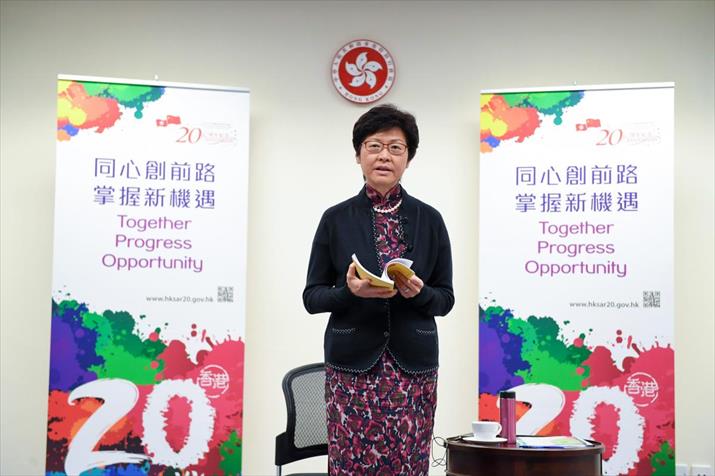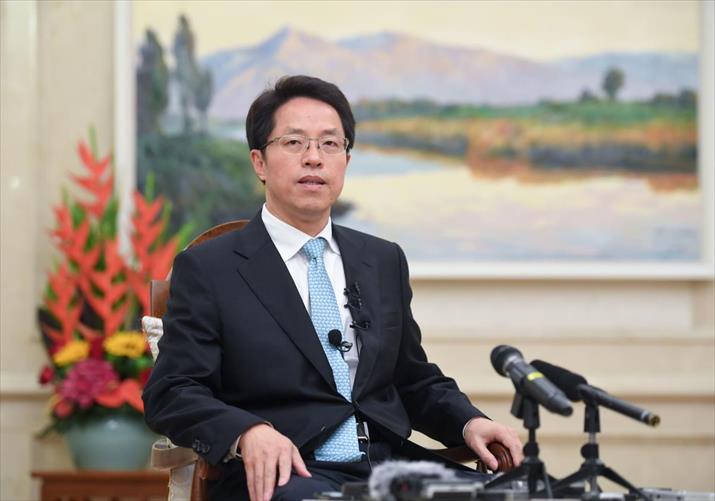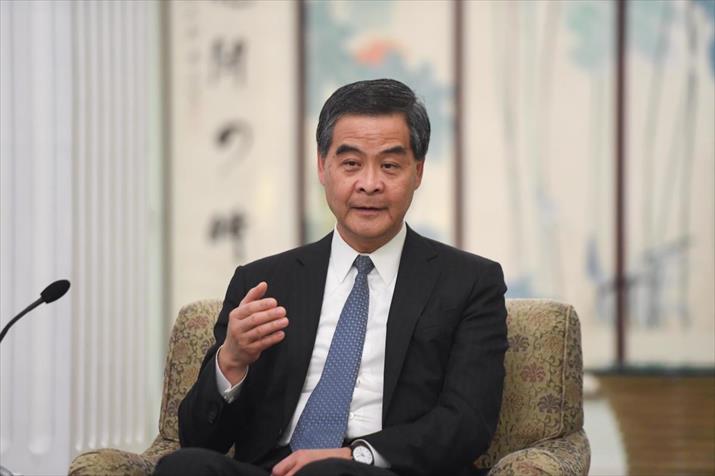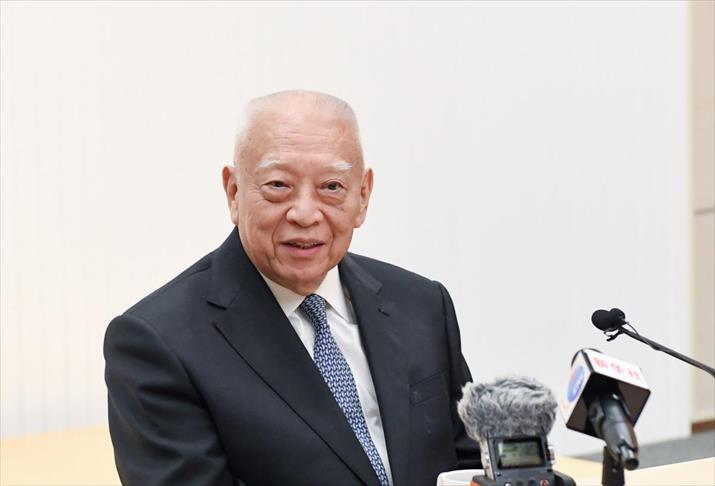| Opinion |
| Review of the Past, Expectations of the Future | |
| Officials share their visions for the Pearl of the Orient | |
|
|
|
On the 20th anniversary of Hong Kong's return to the motherland, Lam Cheng Yuet-ngor, Chief Executive of Hong Kong Special Administrative Region (SAR), Zhang Xiaoming, Director of the Liaison Office of the Central Government in Hong Kong, Leung Chun-ying,former chief executive of Hong Kong SAR, and Tung Chee-hwa, first chief executive of Hong Kong SAR, spoke to Beijing Review about Hong Kong's development in the past two decades and the prospects for the SAR in the future. Edited excerpts of their interviews follow:
 Lam Cheng Yuet-ngor
Lam Cheng Yuet-ngor: Building Hong Kong Into a Vigorous and Prosperous City
I have worked in the government for 36 years, half of it before Hong Kong's return to China and half after it. So I can say that I have witnessed the overall development before and after the return. I think in the past 20 years, Hong Kong has successfully implemented the "one country, two systems" principle and enjoyed a high degree of autonomy, which has contributed to its prosperity and stability. With support from the Central Government, Hong Kong has successfully coped with difficulties and crises. After the return, the core values of "one country, two systems," Hong Kong people administering Hong Kong and a high degree of autonomy, as well as the rule of law and freedom in Hong Kong, have remained unchanged. This is the original intention of the "one country, two systems" principle. I participated twice in work related to Hong Kong's return to China. The first time was in 1985, when I took part in legislative work related to Article 24 of the Basic Law of Hong Kong, and the second was in 1996, when I participated in the preparation of the 1997 and 1998 budgets. I am honored to be able to participate in this great cause. It is meaningful to be able to contribute to the smooth return of Hong Kong. When I was elected to be chief executive, and later was appointed by the Central Government, I felt heavy responsibility and there was a long way to go. The SAR chief executive is accountable to the Central Government as well as the SAR Government. To deal with the relationship between the Central Government's requirements and the local conditions in Hong Kong, it is necessary to follow the Basic Law precisely. "Hong Kong independence" has no grounds. "One country, two systems" means Hong Kong SAR is an integral part of China, and Hong Kong's return is conducive to safeguarding the sovereignty, security and development of the country. I believe that the vast majority of Hong Kong people have never felt that "Hong Kong independence" is viable. All "Hong Kong independence" acts are against local laws and we must strictly enforce the law. The government cannot allow "Hong Kong independence" thought to spread in Hong Kong. During my election campaign, I expressed the hope that the young people in Hong Kong can cultivate a sense of national identity, feelings for Hong Kong and a global perspective. We will let children know more about the history, culture, politics and social development of Hong Kong, and meanwhile, they must identify with their national identity. How to achieve that? Education is indispensable. Pre-school children should be taught that they are Chinese. Chinese history should be made compulsory in junior high schools. Outside school, the SAR government should intensify its efforts so that children are exposed to more Chinese culture and young people in Hong Kong know about the latest developments in China. Over the next five years, I would like to draw on my past work experience in the government, adhere to the ideas I put forward during the election, and try to make Hong Kong a vibrant city. I expect that in the future, Hong Kong will provide a place where residents can enjoy a very satisfactory life, talented young people can give full play to their strengths, the middle-aged can live and work in peace, and the elderly enjoy their golden years. The government cannot stop at providing public services and regulating the market. It should develop Hong Kong's economy more vigorously. This requires the SAR government to add two new roles, namely, facilitator and promoter. My government will be more open to spending, especially investment expenditure, as long as the Basic Law is not violated. It plans to encourage and guide enterprises to increase research and development investment with preferential tax policies. It also plans to reduce corporate income tax rates to boost the development of small and medium-sized enterprises and startups.  Zhang Xiaoming
Zhang Xiaoming: Unique Governance Model Bears Fruit Under the principle of "one country, two systems," Hong Kong has been incorporated into the national governance system. Since Hong Kong's return, the Central Government has exercised effective jurisdiction over Hong Kong. The Chinese national flag and the regional flag of Hong Kong SAR have replaced Hong Kong's previous flag. The People's Liberation Army has taken over Hong Kong's defense, and the Central Government has been in charge of its foreign affairs. Also, the Basic Law of Hong Kong SAR has been established as the supreme law in Hong Kong's legal system. The SAR system enshrined in the Basic Law has been functioning well. The powers that shall be vested in the Central Government, according to the Basic Law, such as the appointment of the chief executive and principal officials, the interpretation of the Basic Law and decisions on constitutional development, have been exercised effectively. Generally speaking, the Central Government's management system over Hong Kong SAR has been running smoothly, highlighting state sovereignty and safeguarding national security. Stability and prosperity have endured in Hong Kong since its return. It has upheld its role as a global financial, shipping and trade hub and is recognized as one of the world's freest economies and most competitive regions. Its favorable business environment has been acknowledged worldwide. From 1997 to 2016, Hong Kong's regional GDP registered an average annual growth rate of 3.2 percent in real terms, which was among the highest in developed economies. Hong Kong's progress is illustrated in many aspects of its economy and society. Its achievements are hard won, given the impact over the past two decades of the Asian financial crisis, the severe acute respiratory syndrome (SARS) epidemic and the global financial crisis. People in Hong Kong have become masters of their region. Since 1997, Hong Kong residents have been entitled to unprecedented democratic rights. Democracy in the electoral systems for the chief executive and the Legislative Council has been enhanced. Hong Kong's ideological features have remained unchanged. Core values cherished by Hong Kong residents such as rule of law, freedom, human rights, justice and integrity are still widely respected. Freedoms of speech, the press and assembly have been bolstered. Hong Kong's exchanges with the mainland have been deepened across the board, leading to increasingly prominent win-win outcomes. Over the past 20 years, the mainland has adopted a series of policies and measures supporting Hong Kong's development and promoting its cooperation with the mainland. Hong Kong has remained the mainland's largest source of inbound investment and mainland companies' largest financing center outside the mainland. It has also become the largest destination for outbound investment from the mainland and the largest offshore renminbi business center. Since 2012, the Communist Party of China Central Committee, with Xi Jinping as the core, has provided guidance on the practice of "one country, two systems" and achieved new breakthroughs in dealing with Hong Kong affairs. For instance, Xi and other top leaders have called for grasping the two fundamental purposes of safeguarding state sovereignty, security and development interests and maintaining the long-term prosperity and stability of Hong Kong and Macao. They have also underlined the importance of balance between adhering to the "one country" principle and respecting differences in the "two systems," between safeguarding the authority of the Central Government and guaranteeing the autonomy of the special administrative regions, and between giving full play to the supportive role of the mainland and enhancing the competitiveness of Hong Kong and Macao. In the future, Hong Kong should further integrate itself into national development. Notably, the Belt and Road Initiative, renminbi internationalization and the development of the Guangdong-Hong Kong-Macao Greater Bay Area will present tremendous business opportunities. The Central Government has reserved a seat for Hong Kong on China's fast train. The key lies in Hong Kong's efforts to meet the needs of the country by making the most of its own strengths. Take the Belt and Road Initiative for instance. Given the huge demand for funding of the initiative, Hong Kong could help expand financing channels, hedge against and mitigate risks, and promote renminbi business in countries along the proposed routes.  Leung Chun-ying
Leung Chun-ying: Making New Contributions to both Hong Kong and the Country Over the past 20 years, the principle of "one country, two systems" has been successfully implemented in Hong Kong. One reason for this is that the principle itself is scientific and pragmatic. At the same time, in the process of implementing it, the Central Government has given a great deal of support to Hong Kong. However, it is normal for new situations and new problems to emerge in the process. To ensure that the principle is fully implemented, it is essential to implement it in strict accordance with the Basic Law. That means that the whole society, including different social strata and sectors, political parties and [government] working staff must comprehensively and correctly understand the Basic Law. We should not only follow the provisions of the Basic Law, but also understand the original intentions of the provisions. Hong Kong's economy and society have grown further since returning to the motherland. At the same time, as our country developed rapidly, the functions and roles of Hong Kong have been constantly changing too. We should take the initiative to adjust ourselves to adapt to the new environment. Now, under the Belt and Road Initiative, as the most internationalized city in our country, Hong Kong can play a better role. When participating in the Belt and Road development, we must consider what the country needs and what Hong Kong is good at. Under the "one country, two systems" principle, Hong Kong has double advantages. In the past, we acted as a connector between the mainland and foreign countries in trade and capital flows. In recent years, we have found and proved that Hong Kong can also act as a connector between the mainland and foreign countries in terms of innovation and technology. In the past five years, Hong Kong has attracted many top international science and research institutions to settle in the city. They came to Hong Kong with an eye on future opportunities to cooperate with the country. So we should continue to adjust Hong Kong's functions in various periods and continuously contribute to national development. Hong Kong has already developed sound economic and trade relations with countries along the Belt and Road. Next, we are going to step up our efforts. Hong Kong and mainland companies are complementary when "going global." For instance, mainland companies are very competitive internationally in building cost-effective infrastructure, while Hong Kong is relatively better at managing these facilities, which has been acknowledged on the Chinese mainland as well as in the international community. Thus, the strengths of Hong Kong and the mainland can be combined in exploring overseas markets. Over the past 30 years, the mainland's reform and opening up has added a wing to Hong Kong. Now we have another wing—the development scheme of the Guangdong-Hong Kong-Macao Greater Bay Area. Hong Kong is highly internationalized, and finance, trade and professional services are its strengths. Hong Kong can cooperate well with the mainland. The Massachusetts Institute of Technology decided to set up its first innovation center outside of the United States in Hong Kong. Why did it choose Hong Kong? Because Hong Kong enjoys the benefit of "one country" and the advantage of "two systems." Hong Kong can serve as the place to carry out innovation, while initial production can be carried out in Shenzhen, and mass production can be carried out in other parts of the Pearl River Delta. Hong Kong and other cities in the Greater Bay Area are strongly complementary. They should coordinate planning, not only planning of facilities and land use, but also economic and social development. I think this is very important. The Greater Bay Area offers big room for economic and social development in Hong Kong. Now, more and more Hong Kong people are working and living in the Greater Bay Area, including the retired. I once led a delegation to a city in the west part of the Greater Bay Area for a three-day visit. We shared the view that remarkable progress has been made there, not only in infrastructure, but also in social management including traffic, hygiene and health. The development level is already very high. The Greater Bay Area is very attractive to Hong Kong. As long as Hong Kong can seize the opportunities brought by the two important initiatives, its future social and economic development will be very promising. Hong Kong's young people are outstanding. Before I took office as the chief executive, I had served as chairman of the board of two universities for 12 years. I enjoyed talking with teachers and students on campus to learn about their study and life. After becoming the chief executive, I took young people with me during at least three visits [to other places]. The growth environment for young people is better than that of our generation, which reflects the progress of Hong Kong and the nation as a whole. Their future prospects are very good. Of course, we should do our best to provide them with opportunities and cultivate them in every respect.  Tung Chee-hwa
Tung Chee-hwa: Tomorrow Will Be Better Hong Kong celebrated its return [to the motherland] on July 1, 1997. The Asian financial crisis occurred shortly after that. Hong Kong is an open economy and thus is always vulnerable to financial shocks. Wherever there are problems, they can easily affect Hong Kong. From 1998 to 2003, Hong Kong suffered a deflation of 13.6 percent. It caused a deep economic downturn. In 2003, we had a very hard time with SARS. Many people lost their lives and our economy was heavily affected. Watching the number of deaths every day, as the chief executive then, I felt both sad and worried. That was the toughest time for us. After the Central Government knew the need of Hong Kong, emergency medical supplies were sent to us immediately. We were touched by the care of the Central Government. Also, after the SARS epidemic, to help Hong Kong's economy shake off its sluggish state, the Central Government allowed individual mainland tourists to travel to Hong Kong, which gave a very effective boost to Hong Kong's economic recovery. In the past 20 years, Hong Kong has encountered many difficulties, and we have finally overcome them with the strong backing of the country. The implementation of the "one country, two systems" principle in Hong Kong is successful. Most Hong Kong people are aware of the significance of the principle and know that it is very important for the development of Hong Kong. "One country" is the premise of the "two systems." The way of life and living habits in Hong Kong have remained unchanged, and our society is relatively stable. The Central Government has firmly guaranteed the smooth operation of Hong Kong's legal system. On the other hand, the number of Mandarin speakers has increased in Hong Kong. In a closer connection with the mainland, Hong Kong people have started to learn more about our motherland. This is a big change. In the past, the economy of Hong Kong relied more on trade with the United States and Europe, but now we are more closely linked with the mainland. Hong Kong should bring into full play our advantages deriving from the "one country, two systems" principle for greater development. Under the leadership of the previous term of SAR government, Hong Kong's economy maintained average nominal growth of more than 5 percent from 2012 to 2016. It is a very impressive performance. The government was concerned about housing and land supply, poverty alleviation, science and technology and education and has made notable achievements in all these areas. [The current chief executive] Lam Cheng Yuet-ngor is a very outstanding leader, and I believe she will do a very good job in the future. I am very confident in the economic development of Hong Kong in the future. Besides, Hong Kong's huge fiscal reserves will be one of our advantages to resolve many problems. The biggest challenge for Hong Kong is to ensure the supply of land and housing. We should also narrow the gap between the rich and the poor and provide opportunities for young people to ascend the social ladder. I personally am very optimistic about the future of Hong Kong. Hong Kong can play a greater role in the nation's development and in return benefit from this process. We can do a lot of things under the "one country, two systems" principle, which is a prominent advantage of Hong Kong. Take the film industry for example. Currently, we can see many elements from the mainland in Hong Kong movies. Before Hong Kong returned to the motherland, it was dubbed as the "Oriental Hollywood" as we produced many movies. But our audience consisted only of people in Hong Kong and Taiwan and overseas Chinese. Now we have more than 1 billion people on the mainland as a potential audience. I don't think Hong Kong has done a very good job in tapping this huge market. But I believe we still have opportunities. As for the education of the younger generation, I think we should make great efforts on this. The country's future is our future. Having a clear understanding of the history and culture as well as the current conditions of our nation is essential for the development of both the society and the individual. Hong Kong is an open society. People, especially youngsters, can make progress only by catching up with the trends of the world and our country. We need to work on such education. It is very important. Copyedited by Sudeshna Sarkar, Chris Surtees and Dominic James Madar Comments to zanjifang@bjreview.com |
|
||||||||||||||||||||||||||||||
|